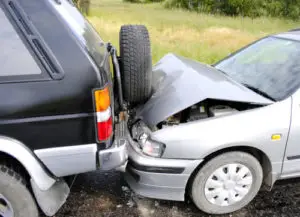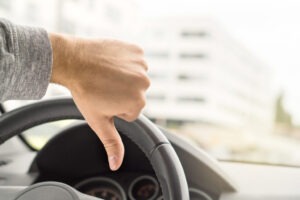
A large part of determining liability in a car accident claim hinges on causation—that is, specific causes of a car accident. Reasons why car accidents take place vary widely, and more than one cause might apply to a particular situation. Sometimes driver behaviors cause car accidents, and other times environmental factors contribute to car crashes. Mechanical failure can also cause car crashes, but might be a result of poor maintenance or a defective car part.
In any case, serious car accidents can lead to severe, sometimes life-threatening injuries that hurt victims and families for months, years, and sometimes decades. According to the Florida Department of Highway Safety and Motor Vehicles (FLHSMV), more than 400,000 traffic collisions occurred on Florida roads in one recent year with about 166,000 resulting in injury and almost 3,000 fatal crashes.
This guide provides some common causes of car accidents. If you were in a car crash, the following information might help you to understand how one or more causes contributed to your accident and if you might have cause to file a personal injury claim against another party.
Driver Behaviors Cause Car Accidents
Whether purposeful or not, drivers’ choices and behaviors behind the wheel lead to the vast majority of car accidents. Below are some driver behaviors that can cause severe injuries and fatalities.
Distracted Driving
According to the FLHSMV, distracted driving includes any behavior that takes your hands away from the wheel, your eyes away from the road, or your mind away from driving. Texting and driving often comes to the forefront in discussions about distracted driving because it satisfies all three of the above requirements. Yet, recent crackdowns in Florida and across the nation have helped curb this dangerous behavior. Yet, many other things besides cell phones can distract a driver and lead to a car accident.
Some examples include:
- Eating and drinking
- Watching an event outside the vehicle
- Personal grooming such as applying makeup, brushing hair or brushing hair
- Adjusting car features such as radios, GPS, climate controls, sunroofs, and others
- Reaching for a dropped item on the floor
- Tending to backseat passengers
- Having heavy or heated discussions with passengers
Speeding
According to the National Highway Traffic Safety Administration (NHTSA), speeding has been a factor in one-third of all fatal car accidents since about 1995. This trend, however, changed in 2017. Currently, the NHTSA estimates speeding leads to a little more than a quarter of all fatal car crashes, making it a dangerous and potentially deadly habit.
People speed for many reasons, but none of them are worth the risk. Car accidents that occur at high speeds are more likely to lead to debilitating and fatal injuries and cause more property damage. When drivers speed, it makes more difficult to control their vehicle, especially if they come upon a road hazard or are traveling during inclement weather. Also, the faster a vehicle is traveling the more distance they need to stop or slow down. Those who speed need more distance to stop, so it also makes it difficult to avoid other drivers who make erratic maneuvers on the road.
Driving Too Slowly
Although slow driving doesn’t always lead to severe or fatal crashes, it is still a driving behavior that can lead to car accidents. Driving too slowly is especially dangerous on the interstate and busy multi-lane highways. Driving too slowly disrupts the traffic flow and can cause an accident, especially when drivers go to slow in the fast lane. In some cases, the slow driver might cause an accident between other motorists and escape accidents and injuries. Florida law requires drivers to operate in the right lane and use the left lane when driving on roads with multiple lanes.
Drunk and Drugged Driving
Drinking and driving or using drugs and driving is not only dangerous, but also illegal. Fortunately, drug and/or alcohol-related car accidents have trended downward in Florida during the last few years. In Sarasota County, drunk driving accidents are more numerous than car accidents involving drugs, illegal or prescription.
In its most recent data, the Florida Department of Highway Safety and Motor Vehicles (FLHSMV) estimates a little more than 5,100 alcohol-related crashes, including more than 3,000 injuries and 374 fatalities on Florida roads in 2017. Crash statistics for drug use include 668 traffic collisions, 589 injuries, and 338 fatalities across the state during the same time frame. Some of the statistics might be impacted by the fact that alcohol use is more common than drug use, but drug use caused far more fatalities as a percentage of total drug crashes.
Cannabis use poses the greatest risk to others on the road. With more states legalizing marijuana and an overall decrease in the social stigma of its use, more drivers are getting behind the wheel. Alcohol use is easily quantifiable for law enforcement by using breath or blood alcohol tests. It’s different for marijuana use; there is no legal limit, nor is there an easy way to measure impairment.
Yet Florida remains diligent about preventing driving while high. Cannabis use impacts each person differently, so police look for common signs such as memory issues, poor hand-eye coordination, inability to focus, and slow reaction times. Regardless of whether a driver uses drugs or alcohol, their impairment causes dangerous car accidents when he or she cannot react appropriately to information while driving.
Drowsy Driving
Drivers who haven’t had enough sleep can be as dangerous as drunk drivers. In fact, the Federal Motor Carrier Safety Administration (FMCSA) has found that a driver without 18 hours of sleep suffers the same level of impairment as a driver who has a 0.08 blood or breath alcohol level. In Florida, legislators have dedicated a week each year to educate the public about the risks associated with drowsy and fatigued driving.
When drivers aren’t sufficiently rested, they have slower reaction times, impaired senses, and difficulties judging time and distance. Sleepy drivers risk falling asleep at the wheel, or nodding off for a few seconds. Continued lack of sleep leads to driver fatigue, but driving against your body’s natural time clock can also cause fatigue. Those who work overnight, commercial drivers, and those with untreated sleep disorders pose the most danger for those with whom they share the road.
Failure to Use Turn Signals
Data about the use of turn signals is limited among research conducted by national, state, and local agencies. Yet, a landmark study from 2012 found that almost 50 percent of 12,000 drivers did not use their turn signal to change lanes and about 25 percent of drivers did not use their signals to indicate a turn.
In their analysis of the data, researchers who conducted the study concluded that each year approximately 2,000,000 traffic crashes across the United States are a consequence of drivers who neglect to use their turn signals. This is more than twice the amount of car crashes the U.S. Department of Transportation attributes to distracted driving. Drivers who consistently use their turn signals provide valuable information to others on the road who can react more swiftly and safely to maneuvers, especially those that might occur quickly.
Disobeying Traffic Control Devices
When drivers don’t obey traffic lights, stop signs, and other traffic control devices they can cause severe car accidents. The vast majority of motorists don’t intentionally ignore traffic signals. Instead, it’s more likely they are distracted or are driving with tunnel vision and only paying attention to the vehicle in front of them.
Yet, these devices are in place to make sure drivers are safe on the roads. Disobeying speed limit signs can cause a driver to travel too fast for conditions, ignoring signs that prohibit U-turns can cause an accident when other traffic doesn’t see the illegal turn, and going through a stoplight or stop sign can put a motorist in the middle of traffic, causing a serious, possibly fatal car accident.
Failure to Check Blind Spots
Whether drivers are inexperienced, in a hurry, or have simply become complacent, it’s not uncommon for some to forget to check their blind spots when making turns and changing lanes. Even drivers who regularly glance in their rear-view mirror can cause an accident by changing lanes without clearing their blind spots.
The larger your car, the larger your blind spots. This means you have to take the time to check all your mirrors and possibly glance over your shoulder to check your blind spots, especially when changing lanes. When drivers don’t clear their blind spots, they risk collision with another vehicle.
Expect More, Receive More: Legal Support That Feels Like Family
Environmental Factors Cause Car Accidents
Many different environmental factors might lead to a car accident, but most can be categorized as weather conditions, road conditions, and traffic conditions. In the event environmental conditions have contributed to a car accident that you were involved in, you should know that causation isn’t always clear.
For example, consider a humid summer day in Florida when torrential rains and thunderstorms occur. Visibility is likely limited, winds might be high, and roads might be slippery. A driver’s response to these road conditions can cause an accident, making the environmental cause of the accident secondary to driver behavior. The easiest example is a driver who travels too fast for weather or traffic conditions.
In other cases, drivers might not have any control of environmental factors or their response. For example, the state, county, or city might not maintain roads as well as they should. If a driver comes upon a pothole or sinkhole and loses control of their vehicle, they might cause an accident, yet liability might fall on the party responsible for the roads. The same logic applies when a stop sign is missing or traffic lights are malfunctioning.
Mechanical Failure Causes Car Accidents
When cars break down while on the road, drivers can lose control of their vehicles and cause a severe or deadly accident involving one or more vehicles. Mechanical failures can stem from poor vehicle maintenance, automobile manufacturer defects, and auto part defects.
Poor Vehicle Maintenance
Unlike businesses and trucking companies, the average car owner doesn’t have the legal requirements to perform preventative or other maintenance on their vehicles. This can put others at risk for an accident when poor maintenance causes mechanical failure.
Some examples of poor vehicle maintenance that can cause a serious and potentially fatal accident:
- Worn tires. Car owners must regularly change and rotate their tires to avoid a blowout. Tire blowouts can cause severe accidents and are often cited as the leading cause of rollover accidents. Car owners must also make sure their tires are filled to the appropriate level. Tires with too much air can hydroplane on water, causing a simple rain shower to be dangerous.
- Worn brakes. A vehicle’s braking system requires regular maintenance that includes changing brake pads and filling brake fluid. If a driver doesn’t maintain his or her brakes, deadly accidents might occur. Worn brake pads and old or low fluid can cause brake failure at critical points during a trip, such as intersections and in heavy traffic.
- Worn axles. Fortunately, Florida’s pleasant weather prevents cars from having to deal with rust and wear. Yet, when vehicles age their frames can become weak. Owners must regularly check for structural issues to ensure they don’t have a severe breakdown on the road and potentially cause an accident.
Auto/Auto Part Defects
When car and car part companies design vehicles, they have a responsibility to bring safe vehicles to markets. Yet, sometimes defects can occur in the design and manufacturing phase that can cause severe accidents or injuries. Some examples of defects that can cause car accidents include faulty brake pads, defective tires, and faulty transmissions. Unfortunately, even after manufacturers perform testing, some defects still get past quality control undetected until a failure causes a breakdown and/or accident.
If you were in a Florida car accident, a car accident attorney can help determine your eligibility for compensation and answer any questions you still have.






